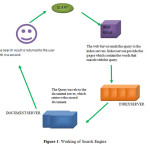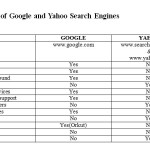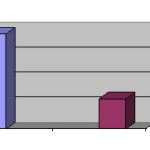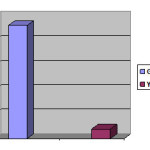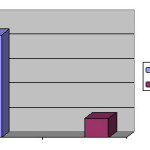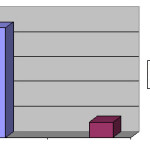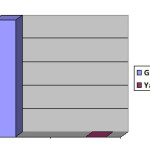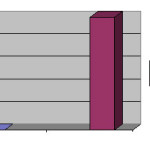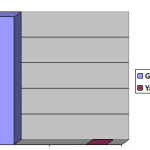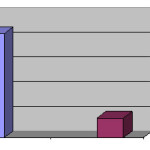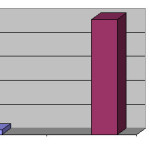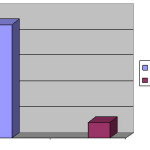INTRODUCTION
WWW plays a vital role in day to day life of people. A large amount of information is available on the web. The friendly user interface and adequate features of the WWW attract the users to access the web. Web holds text documents as well as multimedia information like images, videos, sounds, graphics etc. Internet has become the most major and important network which connects millions and even billions of people all around the world. It’s the cheapest, fastest and easiest way of communication. Internet provide many services like e-mail, messaging, video conferencing, online banking, social networking, online shopping, weather forecasting and many more. A web search engine is a software system that is designed to search for information on the WWW. SE is a software program or script available through the Internet that searches documents and files with keywords and returns a list of the documents where the keywords were found. It is a type of website that helps computer user to locate information on the Internet. Search engines are some of the most advanced websites on the web. These programs allow users to input keywords or queries into the interface, then the search engine systems immediately search the information related to the query.
Quickly after a search is submitted the results appear on screen. This is called a search engine results page (SERP). The SERP is a list of web pages that contain matches to the keywords that were searched. The SERP usually shows web pages names, short descriptions and a link for each matching web page. The user can click on any of the links to go to one of the websites.
Search Engine uses the special algorithms to sort the web pages on SERPs. The most popular or highest quality web pages will be near the top. Search engines are very useful to find information about anything quickly and easily. Using more keywords or different keywords improves the results of searches.
1.1 About Google
Google Search is a web search engine owned by Google Inc. Google Search is the most-used search engine on the World Wide Web, receiving several hundred million queries each day through its various services. Google Search was originally developed by Larry Page and Sergey Brin in 1997. Google Search provides at least 22 special features beyond the original word-search capability. These include synonyms, weather forecasts, time zones, stock quotes, maps, earthquake data, movie show times, airports, home listings, and sports scores.
1.2 About Yahoo
In January 1994, Yang and Filo were electrical engineering graduate students at Stanford University when they created a website named “Jerry’s guide to the World Wide Web”. In March 1994, “David and Jerry’s Guide to the World Wide Web” was renamed “Yahoo!” The “yahoo.com” domain was created on January 18, 1995. The word “yahoo” is an acronym for “Yet another Hierarchical Officious Oracle”. The term “hierarchical” described how the Yahoo! database was arranged in layers of subcategories. The term “oracle” was intended to mean “source of truth and wisdom”, and the term “officious”, rather than being related to the word’s normal meaning, described the many office workers who would use the Yahoo! database while surfing from work. Yahoo! operates a portal that provides the latest news, entertainment, and sports information. The portal also gives users access to other Yahoo! services like Yahoo! Mail, Yahoo! Maps, Yahoo! Finance, Yahoo! Groups and Yahoo! Messenger.
2.0 REVIEW OF LITERATURE
According to Thelwall, (2000) Search engines index only a proportion of the web and this proportion is not determined randomly but by following algorithms that take into account the properties that impact factors measure. Hassan, (2001) investigates image search engines (ISEs) on the Internet. A total of 23 ISEs were examined in an attempt to investigate, evaluate, and characterize their common features. Each individual ISE was evaluated against the common features. Attempts to summarise the most comprehensive and complete ISE by looking at their significant features. Bar-Ilan, (2011) study results indicate that the group of users’ preferred local Google interface, i.e. Google succeeded in its country-specific customization of search results. Zhang, (2007) said many search engines are equipped with multiple language support features; an indispensable translation feature is implemented in only a few search engines. Multiple language support features in search engines remain at the lexical level. Dudek, (2007), study shown that no one-search engine holds the key to ultimate search results. Just as there is cultural, political and geographical differences in the world’s population, there are a number of search engines to fit the individual needs of every net citizen. It was found that the speed of search engine results has become a high priority to participants. Maxymuk, (2008) said the web is a vital and fertile layer where new ideas continually lead to innovations – some good, some not. While Google continues expanding and evolving, others persistently appear on the horizon with their own slant. Lewandowski, (2011) Compare the performance of the major search engines Google, Yahoo!, and MSN was found to be the best, with around 90 per cent of queries answered correctly. According to Large, (2000) the World Wide Web offers access to information resources in many languages. Certain developments facilitate multilingual exploitation of these resources. Some search engines, for example, allow the user to restrict retrieved sites to those in particular languages; some also provide the searcher with an interface in a chosen language. Many web sites also offer their information in several languages, one of which typically is English. Arnold, (2006) said Locating a particular digital item is difficult on the web. Google and other search engine companies are becoming application platforms. Jamali, (2010) research results show that Google is the most used for problem-specific information seeking. The results also show the growing reliance of scientists on general search engines, particularly Google, for finding scholarly articles.
3.0 HOW DO SEARCH ENGINES WORK?
Search engines are answer machines. When a person searches for something online, it requires the SE. Search engines are the key to finding specific information on the vast expanse of the World Wide Web. Without search engines, it would be almost impossible to locate anything on the Web without knowing a specific URL.
There are three basic stages for a search engine:
3.1 CRAWLING where content is discovered.
Crawler-based search engines are those that use automated software agents called crawlers that scanning the Web site and getting a complete list of everything on there – the page title, images, keywords it contains, and any other pages it links. The crawler returns all that information back to a central pool, where the data is indexed. The crawler will periodically return to the sites to check for any information that has changed. The frequency with which this happens is determined by the administrators of the search engine. To find information on the hundreds of millions of Web pages, a search engine employs special software robots, called spiders, to build lists of the words found on Web sites. When a spider is building its lists, the process is called Web crawling. In order to build and maintain a useful list of words, a search engine’s spiders have to look at a lot of pages. How does any spider start its travels over the Web? The usual starting points are lists of heavily used servers and very popular pages. The spider will begin with a popular site, indexing the words on its pages and following every link found within the site.
3.2 INDEXING where content is analyzed and stored in huge databases.
In this, search engines take a “screen shot” of the content that spiders can see and understand and store it a massive database. When the spiders have completed the task of finding information on Web pages, the search engine must store the information in a way that makes it useful.
In the simplest way, a search engine could just store the word and the URL where it was found. since there would be no way of telling whether the word was used in an important or a petty way on the page, whether the word was used once or many times or whether the page contained links to other pages containing the word. Most of the search engines store more than the word and URL to give the more useful results. The engine might assign a weight to each entry; each commercial search engine has a different formula for assigning weight to the words in its index. This is one of the reasons that a search for the same word on different search engines will produce different lists, with the pages presented in different orders.
Indexing allows information to be found as rapid as possible. There are various ways to create the index, but most effectively used way to create index is Hashing. In hashing a hash table is created by apply a formula to numerical value, which is attached with each word.
RETRIEVE INFORMATION
user type in a search interface and search engines match indexed content with users’ search queries and retrieve the most relevant and reliable information from their database.
4.0 Several similarities of Google and Yahoo search engines are found after visiting both Websites and testing with a query.
- Both search engines provide the various guidelines to users to search proficiently. The most important guideline is to use specific and unique words to describe what we are searching. If the keywords are more general or ambiguous words, the large number of irrelevant feedback documents will be retrieved.
- Both search engines provide many categories for the search results, such as web, images, videos, shopping, news, and sports. With selecting a specific category like images, a user can retrieve only images on the webs.
- When typing the keywords, Yahoo suggests the full key words as well as Google.
- The search results of both engines are quite similar patterns, which show the title in the first line, the brief description of webpage in the next several lines, and the URL or webpage’s address. This fragment for each web result is enough information that a user can quickly scan and move to find information from other web pages in the ranked results. After submitted a query, both search engines immediately returned the relevant results, along with the large total number of websites retrieved. This shows the ability and efficiency of both search engines.
4.1 Visiting both Google and Yahoo web pages and testing them with a keyword, some differences between them are found.
- Google shows only the search interface, the Google ‘brand picture and the other categories of search types, such as images, videos, map, news and YouTube. Instant homepage of Yahoo Search engine is more colorful and attractive as compare to Google. Yahoo provides not only the interface but also updated news, new trend, other links like game, hot jobs, messenger, movies, sport, finance, travel, and weather. These colorful links are with small pictures on the navigator menu that user can quickly click on these links
- Google retrieve relevant results faster and more precise than Yahoo.
When testing both search engines with the queries “Indian culture”, Google returned the results faster and more relevant results than Yahoo; Google returned many websites about Indian culture within few milliseconds. Moreover, the first top five results from Google give more relevant data as compare to the Yahoo. These represented that Google took greater advantages over Yahoo.
6.0 ANALYZE PERFORMANCE THROUGH SURVEY
Now a day, life is very much dependent on the internet and Web is used to get all type of information very quickly all over the world. The Web has significantly changed the way of people to locate information. A large amount of information is available on the web. User friendly interface of search engine plays an important role for analyzing the best search engines. So, search engine should be contented and easy to use for their users. So, there is a need to understand that how people utilize the web, how often they access internet, which search engine they like the most. For answering these questions or for analyzing the performance of these two search engines, I conducted a survey on 25 faculty members.
6.1 OBJECTIVE OF THE SURVEY
This survey is conducted to know the thinking of users regarding the search engines:
- Which search engine has more search capabilities?
- Which provides great ease of use?
- Which is the best from the user’s point of view?
Survey results will be used to find out that which search engine performs best. Following are the questions taken in the survey and the responses of the participants.
7.0 RESULT
Q1. Have you heard about these search engines? Yes/No
a) Google
b) Yahoo
Only 76% person are heard about the Google Search Engine and 24% person are heard about the Yahoo Search Engine. So according to the survey Google is most popular Search Engine
Q2. Which of the following search engines you use most often?
a) Google
b) Yahoo
The 92% pupils were in favor to use the Google Search engine as compare to Yahoo, which can be used by only 8% pupils. So Google is more used as a Search engine.
Q3. Which of the following search engines provide ease of use?
a) Google
a) Yahoo
The Google search engines provide ease of use with 84% as compare to Yahoo Search Engine with 16%.
Q4. How often do you search “images” on the search engines?
a) Google
b) Yahoo
To search the images, the 88% persons are in favor to use the Google as compare to the Yahoo Search Engine which has only 12% person used for to search images.
Q5. Which search Engine you have used to search Books?
a) Google
b) Yahoo
For searching the EBooks, 100% person will go to the Google Search Engine as compare to Yahoo Search engine.
Q6. Which Search engine provides the shopping option?
a) Google
b) Yahoo
For shopping purpose, most of the pupils use the Yahoo Search Engine with 100% as compare to the Google SE.
Q7. Which Search Engine provide the social connectivity
a) Google
b) Yahoo
Google is the only Search Engine which provides the Social Connectivity (orkut, which is used earlier) as compare to Yahoo SE.
Q8. Business services are provided by the __________ search engine.
a) Google
b) Yahoo
Business Service is provided by the Google SE as compare to Yahoo SE with 100%.
Q9. Which search engine has Multi language support?
a) Google
b) Yahoo
Google is the only SE which is well supported by the multiple languages for searching the web content as far as yahoo were concerned, it doesn’t give this facility.
Q10. Rank the Search Engines (1st or 2nd)
a) Google
b) Yahoo
Google SE were took the first position in ranking with 84% and Yahoo took the 2nd position with 16%.
Q11. Mapping of navigation through which search engine is clear?
a) Google
b) Yahoo
Mapping of navigation through Google SE is clear and 100% respondents supports this statement as compared to Yahoo navigation feature were not used by the respondents.
Q12. Which search engine give maximum information/updates about the career?
a) Google
b) Yahoo
Information regarding the career is provide by the yahoo SE, 96% person used the Yahoo SE for searching the information regarding the career as compare to the Google SE.
Q13. Translation services were provided by which search engine?
a) Google
b) Yahoo
Translation services were provided by the Google SE as compared to Yahoo SE into various languages
Q14. Which search engine fulfills most of your needs?
a) Google
b) Yahoo
According to the survey the Google SE is mostly fulfill all the needs of the user as compared to Yahoo SE.
Q15. From which search engine you get the quality output?
a) Google
b) Yahoo
For any SE the quality is the most important factor for the success and failure of the SE. According to the survey, the Google SE is providing the good quality output as compare to Yahoo SE.
CONCLUSION
Searching is one of the common tool for seeking online information. Search engines are the resources that help the people to search any kind of information on the web in a simple and easy way. The purpose of this study is to presents the extensive review and analysis of search engines and examines the user behavior while interacting with search engines.
From our analysis of the two search engines, I conclude that Google is best till date. People like to search information on Google as it provides better interface, features and ease of use to the users. It performs better than the other search engines but in some places Yahoo SE is better.
REFERENCES
- Thelwall, M. (2000) “Web impact factors and search engine coverage”, Journal of Documentation, Vol. 56 Iss: 2, pp.185 – 189
CrossRef
- Hassan, I. and Zhang, J. (2001) “Image search engine feature analysis”, Online Information Review, Vol. 25 Iss: 2, pp.103 – 114
CrossRef
- Bar-Ilan, J. and Levene, M. (2011) “A method to assess search engine results”, Online Information Review, Vol. 35 Iss: 6, pp.854 – 868
CrossRef
- Zhang, J. and Lin, S. (2007) “Multiple language supports in search engines”, Online Information Review, Vol. 31 Iss: 4, pp.516 – 532
CrossRef
- Dudek, D. and Mastora, A.and Landoni, M.(2007) “Is Google the answer? A study into usability of search engines”, Library Review, Vol. 56 Iss: 3, pp.224 – 233
CrossRef
- Maxymuk, J. (2008) “No search limits”, Bottom Line: Managing Library Finances, the, Vol. 21 Iss: 4, pp.132 – 134
CrossRef
- Lewandowski, D. (2011) “The retrieval effectiveness of search engines on navigational queries”, Aslib Proceedings, Vol. 63 Iss: 4, pp.354 – 363
CrossRef
- Large, A. and Moukdad, H. (2000) “Multilingual access to web resources: an overview”, Program: electronic library and information systems, Vol. 34 Iss: 1, pp.43 – 58
CrossRef
- Arnold, S. (2006) “Search: the new application platform”, Electronic Library, Vol. 24 Iss: 2, pp.121 – 125
CrossRef
- Jamali, H.and Asadi, S. (2010) “Google and the scholar: the role of Google in scientists’ information-seeking behavior”, Online Information Review, Vol. 34 Iss: 2, pp.282 – 294
CrossRef
WEBSITES
- http://en.wikipedia.org/wiki/Web_search_engine
- http://computer.howstuffworks.com/internet/basics/search-engine1.htm
- http://searchenginewatch.com/article/2065173/How-Search-Engines-Work
- http://moz.com/beginners-guide-to-seo/how-search-engines-operate
- http://www.servintfree.net/support/trainingdocs/searchengines.pdf

This work is licensed under a Creative Commons Attribution 4.0 International License.
